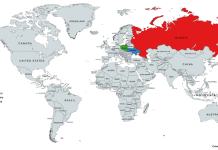
Apple has removed the ICEBlock application from its App Store after the U.S. Department of Justice warned that the program could endanger federal immigration officers. The decision followed a direct request from Attorney General Pam Bondi and has fueled debate about free speech, technology, and public safety.
ICEBlock, a crowdsourced tracking tool, allowed users to share sightings of Immigration and Customs Enforcement (ICE) agents within a few miles of their location. Since its launch in April, the app had been downloaded more than one million times. Supporters viewed it as a community alert system, while federal officials said it could expose officers to harm.
Bondi confirmed Thursday that the Justice Department contacted Apple to request the app’s removal, calling it a matter of safety for law enforcement. She said the department would continue to take steps to protect agents from threats linked to online tools that identify their movements.
The request came days after a shooting at an ICE facility in Dallas, where investigators said the gunman had searched his phone for tracking software before the attack. Authorities said he appeared to target federal officers and left behind a bullet inscribed with anti-ICE language.
In a statement, Apple said it reviewed information provided by law enforcement and determined that ICEBlock violated its policies on user safety. The company said its marketplace is intended to promote secure, responsible use of technology and that it removes applications posing risks to individuals or groups.
Google later confirmed that it had also deleted several comparable apps from its Android store, though ICEBlock itself was never listed there.
Joshua Aaron, the developer behind ICEBlock, criticized Apple’s action, calling it a response to political pressure rather than an impartial decision. He said the app operated in a way similar to other location-based platforms that allow users to report traffic or police activity. Aaron added that the tool had been reviewed by Apple before publication and that no content changes were made after approval.
Advocates for immigrant communities also objected to the removal, saying the app provided a sense of awareness during a period of aggressive immigration enforcement. Kica Matos, head of the National Immigration Law Center, said that taking down such tools limits public understanding of how enforcement unfolds in neighborhoods affected by ICE activity.
Officials from the Department of Homeland Security defended Apple’s decision, arguing that the safety of agents outweighs concerns about online monitoring. ICE Deputy Director Madison Sheahan said that while digital communication can be valuable, it becomes dangerous when it interferes with law enforcement operations.
The dispute surrounding ICEBlock reflects a wider conversation about the intersection of technology, privacy, and government power. As Apple and Google act to restrict tracking apps, critics warn that such decisions may shape who controls access to information in an increasingly digital society.
This image is the property of The New Dispatch LLC and is not licenseable for external use without explicit written permission.







